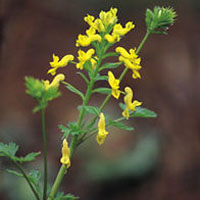Corydalis
 © Martin Wall
© Martin WallHow It Works
Scientists have isolated a number of alkaloids from the tuber of corydalis, including corydaline, tetrahydropalmatine (THP), dl-Tetrahydropalmatine (dl-THP), protopine, tetrahydrocoptisine, tetrahydrocolumbamine, and corybulbine.3 Of the full range of 20 alkaloids found in the plant, THP is considered to be the most potent. In laboratory research, it has been shown to exhibit a wide number of pharmacological actions on the central nervous system, including analgesic and sedative effects.4 dl-THP has been found to exhibit a tranquilizing action in mice. Scientists have suggested that dl-THP blocks certain receptor sites (e.g., dopamine) in the brain to cause sedation.5
In addition to its central nervous system effects, studies in the laboratory have shown the alkaloids from corydalis also have cardiovascular actions. For example, dl-THP has been shown to both decrease the stickiness of platelets and protect against stroke,6 as well as lower blood pressure and heart rate in animal studies.7 Additionally, it seems to exert an anti-arrhythmic action on the heart. This was found in a small double-blind clinical trial with patients suffering from a specific type of heart arrhythmia (e.g., supra-ventricular premature beat or SVPB).8 People taking 300–600 mg of dl-THP per day in tablet form, had a significantly greater improvement than those taking placebo pills.
Other human clinical trials on dl-THP have shown the ability to fall asleep was improved in people suffering from insomnia after taking 100–200 mg of dl-THP at bedtime. No drug hangover symptoms such as morning grogginess, dizziness or vertigo were reported by people taking the alkaloid extract.9
Reports from Chinese researchers also note that 75 mg of THP daily was effective in reducing nerve pain in 78% of the patients tested.10 Painful menstruation (dysmenorrhea), abdominal pain after childbirth, and headache have also been reported to be successfully treated with THP.11
Extracts of the herb may also be useful in the treatment of stomach ulcers. In a large sample of patients with stomach and intestinal ulcers or chronic inflammation of the stomach lining, a 90–120 mg extract of the herb per day (equal to 5–10 grams of the crude herb) was found to improve healing and symptoms in 76% of the patients.12
How to Use It
For an analgesic or sedative effect, the crude, dried rhizome is usually recommended at 5–10 grams per day.13 Alternatively, one can take 10–20 ml per day of a 1:2 extract.14
Copyright © 2024 TraceGains, Inc. All rights reserved.
Learn more about TraceGains, the company.
The information presented by TraceGains is for informational purposes only. It is based on scientific studies (human, animal, or in vitro), clinical experience, or traditional usage as cited in each article. The results reported may not necessarily occur in all individuals. Self-treatment is not recommended for life-threatening conditions that require medical treatment under a doctor's care. For many of the conditions discussed, treatment with prescription or over the counter medication is also available. Consult your doctor, practitioner, and/or pharmacist for any health problem and before using any supplements or before making any changes in prescribed medications. Information expires December 2024.















